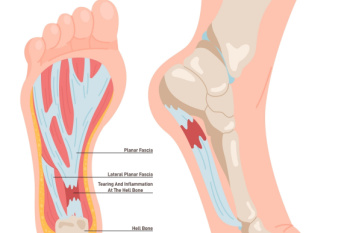
Plantar fasciitis, a common foot ailment, affects millions of individuals worldwide, causing discomfort and hindering mobility. This condition occurs when the plantar fascia, a thick band of tissue connecting the heel bone to the toes, becomes inflamed or strained. It is characterized by sharp pain at the bottom of the foot, particularly near the heel, especially noticeable during the first steps in the morning or after prolonged periods of rest. While the exact cause remains elusive, factors such as overuse, improper footwear, high-impact activities, and tight calf muscles contribute to its onset. Plantar fasciitis is prevalent among athletes, runners, and individuals who spend extended periods on their feet. Fortunately, conservative treatments like rest, stretching exercises, and orthotic inserts, can alleviate symptoms and promote healing in many cases. However, persistent cases may require medical intervention, including corticosteroid injections or surgical procedures. If you have heel pain, it is suggested that you confer with a podiatrist who can accurately diagnose and treat plantar fasciitis.
Plantar fasciitis is a common foot condition that is often caused by a strain injury. If you are experiencing heel pain or symptoms of plantar fasciitis, contact Jon McCreary, DPM from Fort Worth Podiatry. Our doctor can provide the care you need to keep you pain-free and on your feet.
What Is Plantar Fasciitis?
Plantar fasciitis is one of the most common causes of heel pain. The plantar fascia is a ligament that connects your heel to the front of your foot. When this ligament becomes inflamed, plantar fasciitis is the result. If you have plantar fasciitis you will have a stabbing pain that usually occurs with your first steps in the morning. As the day progresses and you walk around more, this pain will start to disappear, but it will return after long periods of standing or sitting.
What Causes Plantar Fasciitis?
- Excessive running
- Having high arches in your feet
- Other foot issues such as flat feet
- Pregnancy (due to the sudden weight gain)
- Being on your feet very often
There are some risk factors that may make you more likely to develop plantar fasciitis compared to others. The condition most commonly affects adults between the ages of 40 and 60. It also tends to affect people who are obese because the extra pounds result in extra stress being placed on the plantar fascia.
Prevention
- Take good care of your feet – Wear shoes that have good arch support and heel cushioning.
- Maintain a healthy weight
- If you are a runner, alternate running with other sports that won’t cause heel pain
There are a variety of treatment options available for plantar fasciitis along with the pain that accompanies it. Additionally, physical therapy is a very important component in the treatment process. It is important that you meet with your podiatrist to determine which treatment option is best for you.
If you have any questions, please feel free to contact our office located in Fort Worth, TX . We offer the newest diagnostic and treatment technologies for all your foot care needs.
